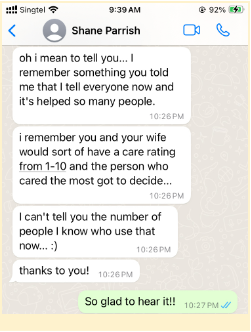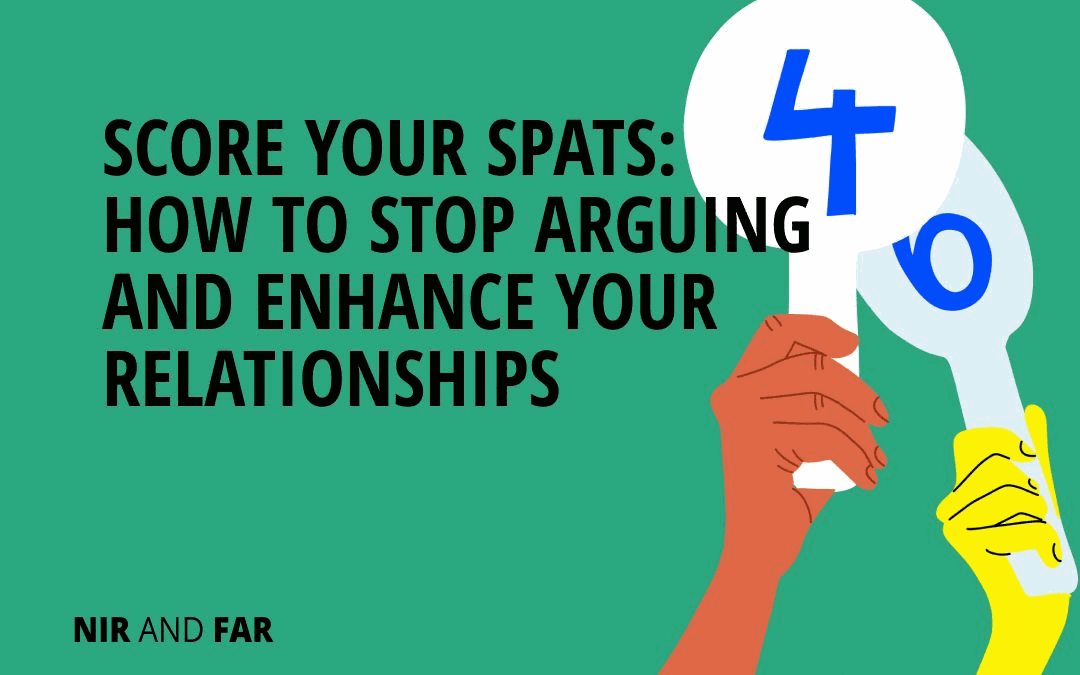
Text conversation with Shane
[10:26 pm] Shane Parrish: oh i mean[t] to tell you… I remember something you told me that I now share with everyone. It’s made a difference for so many.
The “something” he’s referring to is a simple question that my wife and I have posed to each other throughout our 22-year marriage that’s helped us learn how to avoid serious arguments in a relationship.
[10:26 pm] Shane Parrish: I recall you and your wife sort of have a care rating from 1-10. The person who felt stronger got to decide…
[10:26 pm] Shane Parrish: It’s amazing how many people I know use that now… : )
We’ve been using this method for so long, I assumed it was common practice.
Why This Question is a Game-Changer
When my wife and I adopted the “1 to 10” method to gauge the importance of issues in our marriage, it transformed our relationship. This simple question—”How important is this to you on a scale of 1 to 10?”—helps us communicate better and avoid unnecessary conflicts. It’s a practical tool to stop fighting in a relationship and can significantly improve trust and understanding.
Research from Michigan State University and Harvard University highlights a phenomenon called “interpersonal projection bias,” where individuals project their own feelings onto others. This often leads to misunderstandings and arguments in interpersonal relationships. By using the 1 to 10 scale, we avoid these pitfalls by clearly expressing our feelings and priorities.
Scoring to Stop and Prevent Fights in Your Relationship
The size of the disagreement doesn’t matter. Whether it’s about dinner choices or naming your first-born child, this method helps stop arguing in a relationship and keeps relationships strong (most of the time, see exceptions below). Here’s how to use the scoring method to stop arguing with your partner and foster a loving and supportive partnership:
1. Gauge Importance with the 1 to 10 Scale<
When my wife and I moved into our home, we had differing ideas about how things should look. While I had strong feelings about certain aspects, like my workspace setup, other things mattered less to me. Instead of debating every minor detail, we’d check in with each other.
Her: “How do you feel about this couch color?” She’d ask, showing an online photo.
Me: “Not a fan, to be honest.”
Such responses used to frustrate my wife. I seemed dismissive of her choices without suggesting alternatives. This could lead to tension. But with our new approach, the conversation evolved:
Her: “On a scale of 1 to 10, how important is a different color to you?”
Me: “Two.”
Her: “Alright, I value this at a 6, so I’ll go with it.”
Me: “Sounds good! How about Indian food tonight? I’m a 10 for a masala dosa.”
Using numbers provides clarity. Assigning a value to feelings and preferences makes understanding easier. It paves the way for constructive resolutions, strengthening the bond.
Misunderstandings in relationships are common. Tools like the 1 to 10 question are invaluable, anchoring our interactions in mutual respect and understanding. At its core, this method fosters introspection and validation. This is because asking someone to quantify their feelings prompts self-reflection. Conversely, posing the question acknowledges the validity of their feelings.
2. Address Differences in ScoresIf there’s a difference of three or more points, the one feeling stronger usually decides. For instance, if I rate an issue as a 2 and my wife rates it as a 5, we typically go with her preference. This approach ensures that the person who cares more about the issue gets their way, reducing the potential for unnecessary conflict. This technique is particularly useful when figuring out how to stop arguing with my partner.
When addressing the score difference, you should also consider looking for areas of agreement and build on them. Finding common ground helps in creating a sense of unity and reduces the feeling of opposition. It shows that both partners are on the same team.
3. Handle Strong Mutual Preferences
But what if both parties feel strongly? If both rate 8 or higher, it calls for a deeper discussion. This situation is rare, but when it happens, it’s crucial to have an in-depth conversation to understand each other’s perspectives fully. This ensures that both parties feel heard and respected. Give your partner a chance to express their perspective without interruption by listening with empathy. This open and honest communication helps in expressing feelings and concerns without resorting to arguments. By sharing thoughts and emotions transparently, misunderstandings can be minimized, fostering a deeper connection.
In this phase, you should also be willing to make concessions to reach a resolution. Compromise is essential in any relationship and shows that you value your partner’s feelings and needs. It helps in finding a balanced solution that satisfies both parties.
4. Practice Regular Check-Ins
My wife and I don’t use this method daily. Sometimes, weeks pass without mentioning it. Over the years, however, our bond has strengthened, turning arguments into productive conversations. Regular check-ins about significant issues using the 1 to 10 scale help maintain this understanding and prevent conflicts from escalating.
These check-ins allow us to gauge the importance of each issue and address them before they become major problems. This practice has not only improved our communication but also deepened our emotional connection. By continuously working on our relationship, we’ve learned to navigate conflicts more effectively and support each other more genuinely.
5. Apply the Method Selectively
This method shines in close relationships but isn’t universal. For instance, during a zero-sum negotiation, like selling a house, it’s not the right tool. It best suits lasting relationships: spouses, children, close friends, or long-term business associates.
By selectively applying this method to situations where both parties are invested in maintaining a healthy relationship, you can ensure it’s used effectively. In such scenarios, the focus on mutual respect, understanding, and long-term benefits fosters stronger connections and more satisfying resolutions. Conversely, in competitive or transactional interactions, different strategies that prioritize clear outcomes and individual gains might be more appropriate.
Free Distraction Tracker
Reclaim control of your attention today.
Your email address is safe. I don't do the spam thing. Unsubscribe anytime. Privacy Policy.

The Potential for Misuse and Trust
While this method works well in close relationships, it’s not suitable for every situation, such as zero-sum negotiations. It’s most effective with spouses, children, close friends, or long-term business associates.
However, there’s a risk of misuse with this scoring method. Someone might exaggerate their feelings to manipulate the situation, creating an imbalance in the relationship. This misuse can undermine the trust and sincerity that the method aims to foster. Despite this risk, the potential for misuse also serves as a litmus test for trust within the relationship. If one partner consistently exaggerates or manipulates, it reveals underlying trust issues that need to be addressed.
Trust is crucial in any relationship, and this method helps gauge a person’s commitment to the relationship. When both partners approach the method with honesty and integrity, it strengthens the bond and reinforces mutual respect. In this way, the scoring method not only helps resolve conflicts but also builds a stronger foundation of trust and commitment, essential for a healthy and lasting relationship.
Learning how to stop arguing in a relationship and how to stop fighting in a relationship are crucial for maintaining harmony. Sometimes, a simple question can be the bridge to deeper relationships, allowing both parties to express their needs and concerns openly. By implementing this approach, you can create a foundation of trust and understanding, essential elements for any fulfilling relationship.
The question—“How important is this to you on a scale of 1 to 10?”—can clear away confusion and bring people closer together. By fostering clear communication and mutual respect, you can learn how to avoid arguments in a relationship by finding a balanced solution that satisfies both parties to create a peaceful and fulfilling partnership.
| House decor: | ||
| Dinner plans: |
Related Articles
- Schedule Maker: a Google Sheet to Plan Your Week
- Habit Tracker Template in Google Sheets
- The Ultimate Core Values List: Your Guide to Personal Growth
- Timeboxing: Why It Works and How to Get Started in 2025
- An Illustrated Guide to the 4 Types of Liars
- Hyperbolic Discounting: Why You Make Terrible Life Choices
- Happiness Hack: This One Ritual Made Me Much Happier

